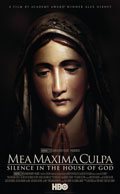
Directed by
Alex Gibney
108 minutes
Rated M
Reviewed by
Andrew Lee

Mea Maxima Culpa: Silence In The House Of God
Synopsis: An investigation into the culture of secrecy that allowed paedophile priests in the Catholic Church to escape scrutiny for decades, if not centuries.Did you know that the Catholic Church has treatment centres for paedophile priests, has had them since the 1930s, and once thought about buying a tropical island to hide them away from the people they preyed on? I didn’t, and neither did a former monk who was given the job of going to parishes where priests were raping the children of their parishoners. His job was to get the priest out, into treatment, and settle with the victims in return for their silence. It was only when he realised that the priests were then being sent to new parishes that he quit in disgust. Facts like these pepper this detailed and anger-inducing documentary. And what’s more it does an excellent job of explaining why this has gone on for so long.
Think of the Catholic Church as a corporate entity. Advancement is dependent on the good favour of those above you, and their position is dependent on the favour of those above them, etc, etc. It’s a vicious circle that excuses nothing but explains much. And the filmmakers build a very strong case for both the moral culpability of the bishops who refused to act, and the guilt of the Vatican, who insisted on silence when these bishops were begging to be allowed to act. Objectively, you wonder why these men didn’t break ranks and simply hand the matter over to the police. But then those that did speak up were silenced by a machine that knows how to deal with dissenters.
It’s not just the low ranking priests who find their hands tied. The former Pope Benedict, then in his previous life as Cardinal Ratzinger, wanted to bring charges against Marcial Maciel Degollado, a notorious paedophile priest. But Pope John Paul II refused to allow this. It was only when John Paul II died, and the Vatican was in mourning, that Benedict was able to quietly send a couple of investigators out to gather the evidence he needed. But even once elevated to Pope, he never acted. One commentator observes that even the Pope is not all powerful in a place as politically-charged as the Vatican City.
But this isn’t the main concern of the film. It’s focus is the stories that pop up during the investigation into a single priest who abused dozens, if not hundreds, of children at a school for the deaf. It’s heartbreaking to see their quest for justice thwarted at almost every step.
Silence In The House Of God isn’t an easy film to watch, but it builds on previous documentaries like Amy Berg’s Deliver Us From Evil to present an even more detailed picture of an organisation unable to deal with its own failings and unable to see past its own self-image to a ghastly reality.

Want more about this film?


Want something different?




